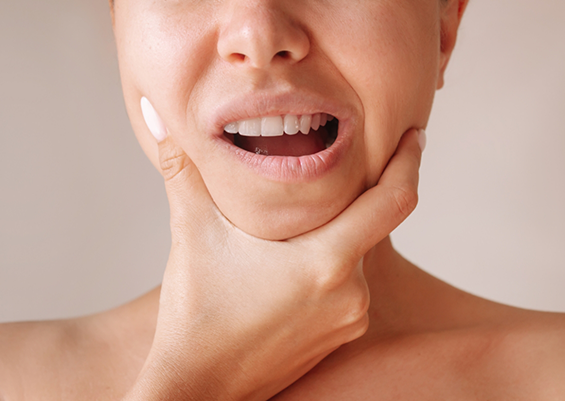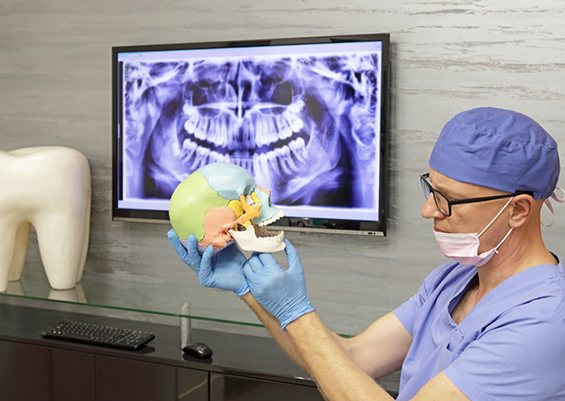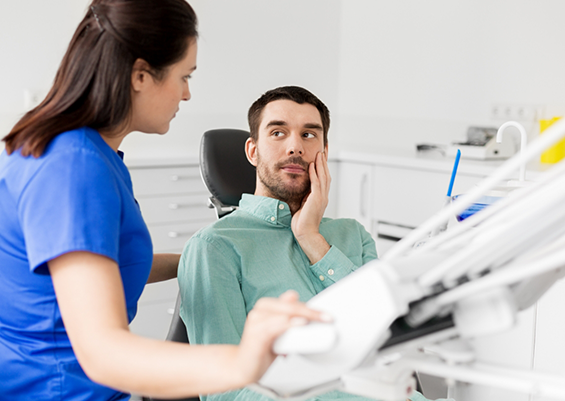TMJ Treatment Ponte Vedra Beach
Enjoy Relief from Chronic Jaw Pain

Your temporomandibular joints, commonly referred to as the TMJ, are some of the most complex parts of your body. They have the important job of attaching your jaw to the rest of your skull, which grants your mouth a wide range of movement. However, this also means that these small, intricate joints are vulnerable to all sorts of problems that can lead to dental pain or other related issues. Our team can treat a wide range of these TMJ issues, so if you’re ready to enjoy relief from chronic jaw pain, give our office a call.
Why Choose Ponte Vedra Family Dentistry for TMJ Treatment?
- Fully Personalized Dental Treatment Plans for All Patients
- Detail-Oriented Dentist with a Keen Eye for Detail
- Advanced Dental Technology Reveals Source of the Issue
Understanding TMJ and TMD

TMJ refers to temporomandibular joint disorder. The temporomandibular joints sit on each side of the head in front of the ears. These joints connect the jaw to the skull and help to make the movements necessary for talking and eating. You may have also heard this termed temporomandibular disorders, or TMD. This refers to multiple conditions affecting the temporomandibular joints. It has as many possible causes as it does management options.
Causes of TMD

The temporomandibular joints and surrounding facial muscles perform complex movements. This joint is one of the most complicated in the body. For this reason, you can easily injure or inflame the TMJ.
Cartilage and small discs surround these joints. They work like shock absorbers to provide smooth movement, and there is no one definitive cause of dysfunction. However, several common things can happen. Sometimes, the discs slip out of alignment or begin to erode. Other times, the surrounding cartilage or muscle sustains damage. This causes the jaw joint to become at-risk, and chronic pain may develop. The pain could be occasional, cyclical, or constant. It can worsen over time if left untreated.
Many things can contribute to TMJ pain:
- Jaw injuries
- Arthritis
- Whiplash
- Bruxism (commonly called teeth grinding)
- Misalignment of the teeth and jaw
- Frequent heavy lifting (resulting in clenching)
- Stress
Often, it’s a combination of two or more of these things that lead to chronic symptoms. TMJ pain affects women more often than men, and the conditions are most common between the ages of 20-40.
TMD Symptoms

You may be suffering from TMJ disorder if you frequently experience one or more of the following:
- Pain in your jaw muscles and surrounding areas
- Pain around your ears and facial muscles
- Difficulty or discomfort while chewing or yawning
- Locking jaw joints
- Headaches
- Neck and shoulder aches
- Facial pain or swelling
- Tinnitus (ringing in the ears)
- Jaw tenderness
- Jaw muscle stiffness
- Grinding, clicking, or popping noises when you open or close your mouth
Diagnosing and Treating TMJ Disorder

TMJ disorders present differently in each patient. There is no standard test for diagnosis. It’s important to have a dental professional diagnose TMD like Dr. Perry or Dr. De Bonis. They will perform a comprehensive exam to rule out other health issues that could be contributing to or causing your symptoms. (For instance, many cases of sleep apnea are related to TMD. Fibromyalgia is sometimes an underlying cause for TMD symptoms, too.)
Our dentist's comprehensive exam will allow them to get a full picture of how everything in your mouth is working. This includes your teeth, gums, muscles, bite, and joints. They will also take your medical history. This means they will listen to anything you would like to relate about your pain and discomfort and how it affects you. This allows them to design the very best treatment plan for your individual needs.
TMJ Treatment Options

For most TMJ patients, the symptoms of TMJ will dissipate over time with self-care treatments and TMD therapy you can perform at home. These include:
- Relaxation techniques
- Physical therapy exercises to improve jaw motion
- Moist heat to relax muscles
- Cold packs to reduce swelling
- Nightguards to prevent teeth grinding
- Anti-inflammatory medications
- Muscle relaxants
Rarely, in-office surgical treatments are necessary for fully relieved pain and discomfort. This occurs in cases of extreme TMJ distress. Surgical treatments include:
- Dental implants to replace one or more missing teeth and stabilize the jaw
- Open joint surgery, where the temporomandibular joint is repaired under general anesthesia
Surgical treatments for TMJ may lead to several days of pain and discomfort due to inflamed tissue. Opening your mouth and chewing may be difficult during this time. However, our dentists and our staff work hard to keep you as comfortable as possible while you heal. As many current patients can attest, Dr. Perry and Dr. De Bonis take a personal interest in each patient’s recovery. They often call to check on patient progress.
Relief is Waiting

At Ponte Vedra Family Dentistry, we believe in treating our patients like family. We are committed to providing patients in Ponte Vedra and Jacksonville Beach with exceptional health care. This includes access to all the information you need to determine your best treatment option for TMJ disorders.
Are you coping with chronic pain due to anxiety about dental treatment? If so, Dr. Perry, Dr. De Bonis, and our compassionate, highly-trained team of dental professionals can help. They will put you at ease and answer any questions you have.
You don’t need to suffer needlessly from temporomandibular joint disorder (TMD) pain. There ARE options for lasting relief. Call our office today to schedule a consultation. You can begin your journey to the pain-free life you deserve.
